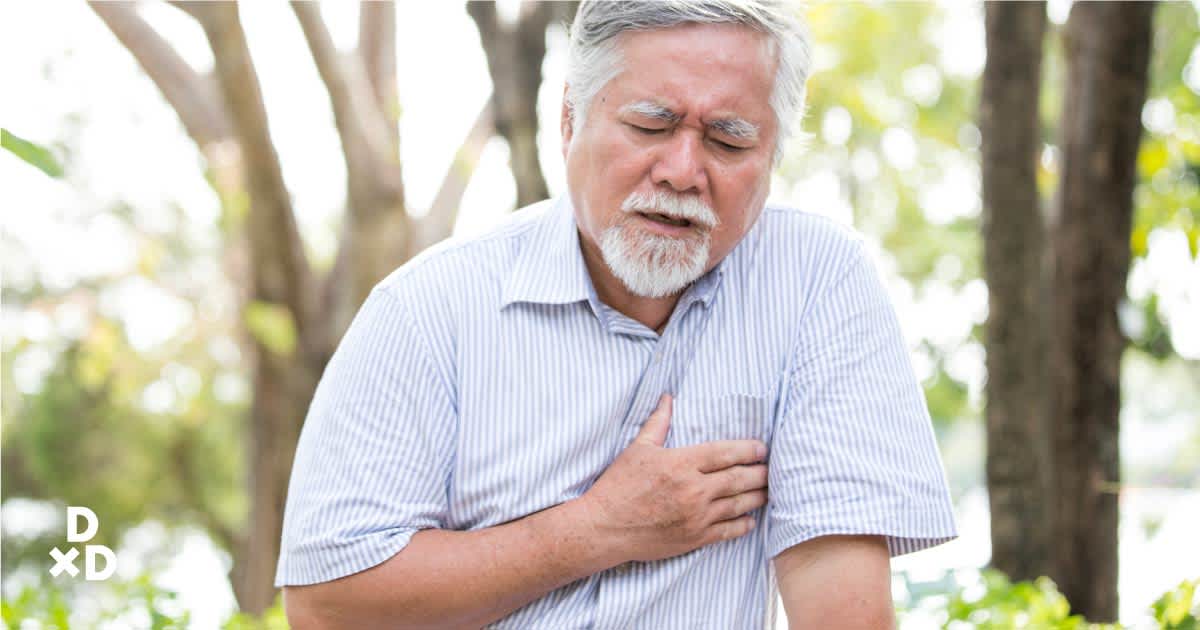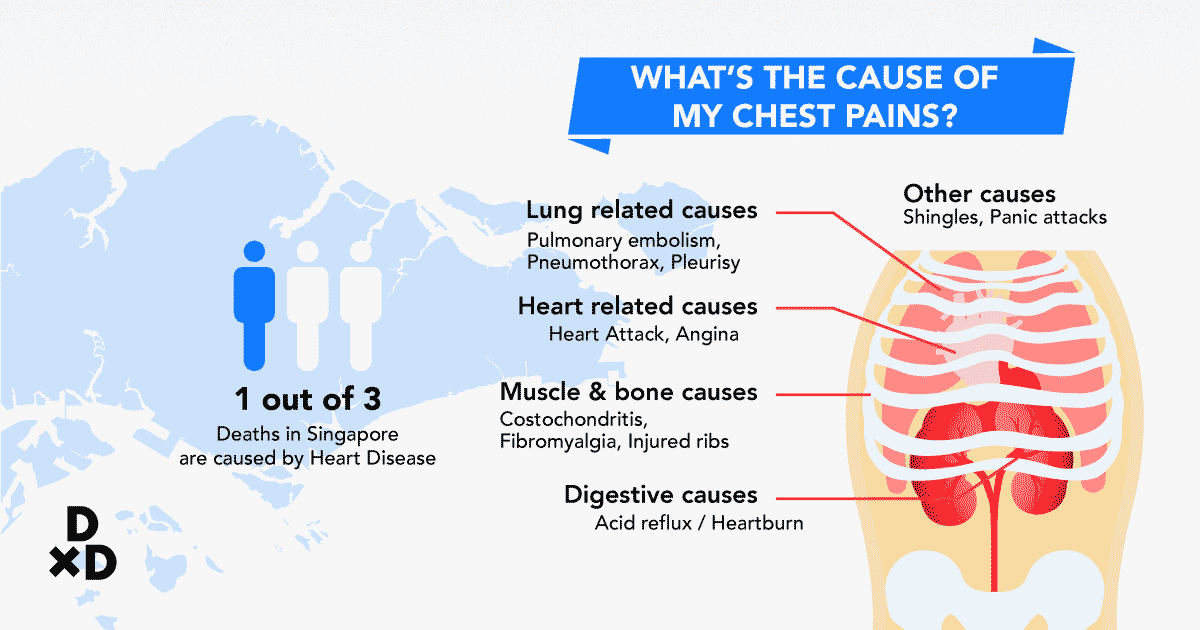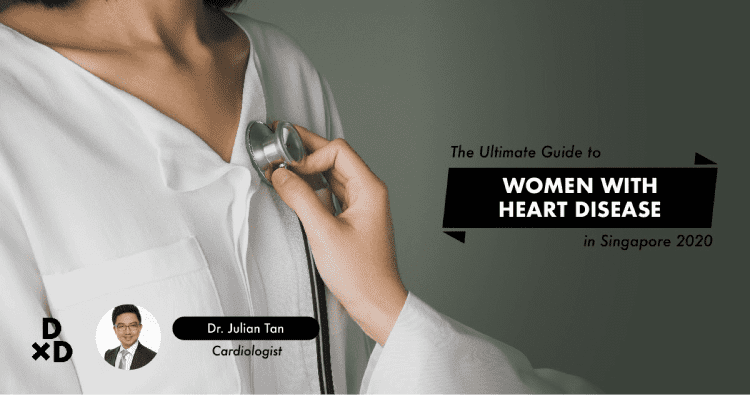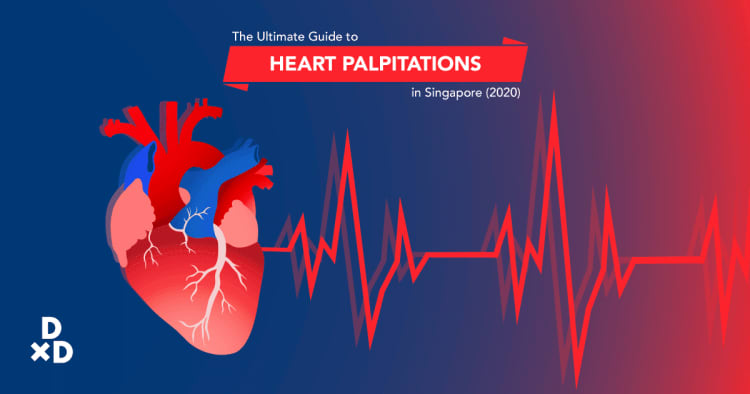Different people can experience different types of chest pains. You can experience it as a sharp pain or a dull ache. Sometimes, the pain can travel up the neck, to the jaw, and even spread to your back or arms.
There are many causes for chest pain and while a lot of them are not life-threatening, those involving the heart or lungs can be signs of a more serious problem. If the chest pain persists for more than 5 minutes, please seek medical attention immediately.
However, if the pain was fleeting or mild, the cause may be something different and chances are they are not related to the heart or lungs.
A Human user once asked “Why do I feel a sharp pain in the chest area when I breathe and who should I consult?” which I answered it.
Then I thought to myself: Why not make a more comprehensive guide to it since this condition is one that can affect you and your loved ones?
So here it is, the more detailed explanation to your chest pain-related questions!
What is chest pain?
Different people can experience different types of chest pains. You can experience it as a sharp pain or a dull ache. Sometimes, the pain can travel up the neck, to the jaw, and even spread to your back or arms [1].

There are many causes for chest pain and while a lot of them are not life-threatening, those involving the heart or lungs can be signs of a more serious problem. If the chest pain persists for more than 5 minutes, please seek medical attention immediately.
However, if the pain was fleeting or mild, the cause may be something different and chances are they are not related to the heart or lungs.

What are the symptoms of non-heart-related chest pain?
There are 3 different types of chest pains that are not linked to heart issues. You can describe them as [2]:
**Momentary chest discomfort. These chest pains are typically described as feeling an electrical shock or a lightning flash. This feeling tends to subside quickly and does not last for more than a few minutes.
**Typical causes of this chest pain include musculoskeletal injuries, inflammation, or nerve pains.
**Pinpoint chest discomfort. This kind of pain worsens as you change positions when you’re breathing. Pain that worsens with the expansion of the chest, like when you are breathing, are typically caused by lung issues.
****Sharp chest pain that improves when you exercise. This kind of chest discomfort is likely to be linked to causes such as acid reflux. They are the opposite of heart-related pains which worsens when you try to exercise.
**
**Related: Is it normal to have chest discomfort if I have anxiety?
**
What are the symptoms of heart-related chest pain?
Heart-related chest pains are usually linked to heart attacks. However, other heart problems can also lead to the following symptoms [1]:
- Pressure or tightness in the chest
- Crushing or burning pain which extends to your neck, jaw, back, shoulders or arms
- Pain that lasts longer than 5 minutes, or comes and goes
- Pain that worsens with activity
- Pain that varies in intensity
- Shortness of breath
- Cold sweat
- Nausea or vomiting
- Dizziness or lack of strength
What are the causes of chest pains?
As mentioned before, there are various conditions that can lead to chest pains. Let us break them down into a few categories so that you can have a better understanding of the cause of the condition you are facing.
1. Heart-related causes
Firstly, we have heart-related causes of chest pains. According to Singapore Heart Foundation, almost 1 out of 3 deaths in Singapore are caused by heart diseases [3]. As such it is no surprise that a large percentage of our population suffers from heart-related chest pains.
Heart-related causes of chest pains include:
- Heart attack. Heart attacks occur when there is a blockage of blood flow to the heart. This disruption in blood flow damages or destroys part of the heart muscles, causing a heart attack [4].
When you suffer from a heart attack, you might experience pain in your chest that goes up to your neck and jaw, and the pain can even spread to your back and arms.
- Angina. Angina is described as a reduction in blood flow to your heart. It is often described as a pressure on your chest or a squeezing sensation [5].
However, angina is not a disease, but instead a symptom of an underlying heart condition like coronary heart disease (CHD) [6]. Angina is a relatively common condition but can be hard to distinguish from other types of chest pains like the discomforts of indigestion.
- Aortic Dissection. Aortic dissection is a fatal but rare condition in which your aorta tears, eventually leading to a rupture through the outside aortic wall [7].
The symptoms of aortic dissection mimic a heart attack where the pain usually starts from the chest and can spread to the neck, jaw, back, and arms.
- Pericarditis. Pericarditis is the irritation and swelling of the thin membrane encompassing your heart. When the irritated layers of membrane (pericardium) rub against each other, you feel pain in your chest [8].
Pericarditis is recognised as a sharp, stabbing pain in the chest, usually in the middle or left side of the chest. Pain is also commonly felt in one or both shoulders. Lying down and taking deep breaths can worsen the pain while sitting up or leaning forward can ease the pain [9].
Find out more about Heart Palpitations in our guide.
2. Lung-related causes
Lung disorders are another type of cause of chest pains. Such disorders include [10]:
Pulmonary embolism. A condition where a blood clot in the pulmonary artery disrupts the flow of blood to the lung tissues.
Pneumothorax. Better known as a collapsed lung, pneumothorax is a condition that occurs when air leaks into the space between the lungs and ribs.
It typically starts out of the blue and can last for up to a few hours. Symptoms can include shortness of breath on top of chest pains.
- Pleurisy. This condition occurs when the lining around your lungs swell, causing a sharp pain in the chest which often gets worse when you take a deep breath or cough.

3. Digestive causes
Another common cause of chest pains is digestive disorders. The most commonly experienced digestive causes are acid reflux or heartburn. Other digestive causes include:
- Swallowing disorders
- Gallstones or an inflamed gallbladder
- Problems in the pancreas
4. Muscle & bone causes
Past injuries to the chest or problems affecting your chest walls can also cause chest pains. Some examples of muscle and bone causes of chest pains are:
Costochondritis. This is the inflammation of the cartilage of your rib cage, causing it to hurt and leading to chest pains.
Fibromyalgia. This is a type of chronic pain syndrome that causes sore muscles and lead to persistent muscle-related chest pains.
Injured ribs. Bruised or broken ribs from accidents can cause chest pains.
5. Other causes
Other causes not categorised above include:
Shingles. Shingles produce a band of blisters starting from the back and spread to the chest walls, causing patients to experience pain in the chest.
Panic attacks. Panic attacks are a period of intense fear accompanied by a list of symptoms. Amongst these signs, chest pains can be felt when you are having an attack.
See also: Are You Heartbroken? A Cardiologist Shares How Feeling Lonely Can Lead to Heart Disease
Who should I seek help for my Chest Pains?
If you are experiencing pain in the front of the chest, you should definitely head to the cardiologist first. Your cardiologist will then decide whether this pain is truly a cardiac cause.
Of course, the cause of your chest pains could be any of the causes I've mentioned above. But most patients with chest pains are alarmed and afraid that it is related to the heart. Heart-related causes usually lead to a lot of fear because it is highly dangerous and can lead to death.
Once we have ruled out the cardiac components, we will decide from there which relevant doctor you should go to.
If you are unsure how to reach out to a cardiologist, there's a guide for you.
Related: 5 Reasons Why You Should Not Ignore Your Chest Pains

What Chest pain treatments are available in Singapore?
Chest pain treatments are typically targeted at the cause of your chest pain. So if you’re having cardiac issues, treating the condition would reduce the symptom of chest pains.
For conditions related to the pressure in your arteries, your doctor may recommend some of the following treatments [11]:
1. Artery relaxers
Nitroglycerin is an artery relaxer that is usually taken as a tablet under the tongue. You should only take nitroglycerin that your doctor has prescribed to you.
Artery relaxers like nitroglycerin allow blood to flow more easily through your narrow arteries. Some blood pressure pills also have the same effect as they widen your blood vessels.
2. Aspirin
Aspirin is a common medicine taken during emergency situations, like during a heart attack. Chewing on a regular-strength aspirin will help to reduce blood clotting, allowing for better blood flow through your arteries [12].
Some things you should take note of before taking aspirin would be to check if you are allergic to aspirin, if you have bleeding problems, or if you’re already taking other types of blood-thinning medication.
If any of the above applies to you, do not take aspirin. Especially so if your doctor has told you not to do so.
3. Thrombolytic drugs
Thrombolytic drugs are another type of medication that is used during emergencies. It helps to dissolve blood clots quickly to allow for blood to reach the heart [13].
4. Angioplasty & stent replacement
This surgical procedure is done to artificially widen the blood vessel that leads to your heart. A stent (wire mesh) is then used to lock the blood vessel in place, keeping the artery open, reducing the pressure buildup in the artery.
You may read up more about this surgical procedure to angioplasty here.
5. Bypass surgery
In the event that your artery is severely clogged and blocking the blood flow to your heart, you can get a bypass surgery. A blood vessel from another part of your body is used to create an alternate pathway for blood to reach your heart, bypassing the clogged artery.
Other types of treatment that target the different causes include:
Acid-suppressing medication. This medication addresses the acid reflux from your stomach into your oesophagus. It helps to reduce the amount of acid in your stomach.
Lung reinflation. If you are suffering from chest pains due to a collapsed lung (pneumothorax), your doctor would suggest that you go for lung reinflation. It is a simple procedure where a tube is inserted in your lungs to reinflate it.
Read more on Lung Cancer Treatment in Singapore
How much does Chest Pain treatment cost?
The costs of some of the treatments for chest pains are summarised in the table below.
Treatment
Estimated cost
Medisave [14]
Consultation and
Diagnostic Tests
$3,000 - $5,000
—
Angioplasty and
stent replacement [15]
$6,000 - $9,000
Up to $2,150
Bypass surgery [16]
$16,050 - $25,000
Up to $6,200
Most heart-related surgeries are covered by Medisave. You can also check with your doctor or insurance-provider if your insurance covers the treatments mentioned above.
Conclusion
Chest pains can be rather dangerous and it is important to seek medical attention immediately since it could be a sign of an underlying condition, especially so if you do not know the cause of your chest pains.
If you are looking to reach out to a doctor for treatments regarding your chest pains, you may do so here.
Although this topic is rather broad, I hope you are able to gain some insights from this read! Remember to always maintain a healthy lifestyle and diet to reduce the risk of developing heart conditions which can lead to chest pains and consult your doctor if you are feeling unwell.












